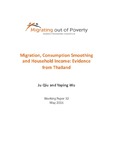| dc.contributor.author | Qiu, Ju | |
| dc.contributor.author | and Wu, Yaping | |
| dc.coverage.spatial | Thailand | |
| dc.date.accessioned | 2019-12-12T15:49:57Z | |
| dc.date.available | 2019-12-12T15:49:57Z | |
| dc.date.issued | 2016-05-01 | |
| dc.identifier.uri | https://opendocs.ids.ac.uk/opendocs/handle/20.500.12413/14845 | |
| dc.description.abstract | The main argument of this paper is that migration does not necessarily reduce informal risk sharing in the village. We model migration as a kind of storage technology with uncertain payments for a household. Theoretical conditions, under which the “technology” can improve risk sharing in a dynamic limited commitment framework, are provided. Our empirical findings also show positive impacts of migration on risk sharing, in particular, when children migrate for education opportunities. The data are from the Townsend Thai Annual Surveys (1999-2010). The impacts of migration on income and on consumption smoothing are jointly estimated in a simultaneously determined system. | |
| dc.description.sponsorship | DFID | |
| dc.language.iso | en | |
| dc.publisher | Migrating out of Poverty | |
| dc.title | Migration, Consumption Smoothing and Household Income: Evidence from Thailand | |
| dc.type | Other | |
| dc.rights.holder | University of Sussex | |
| dc.identifier.externaluri | http://www.migratingoutofpoverty.org/files/file.php?name=wp32-qui-and-wu-2016-migration-consumption-smoothing-and-household-income-evidence-from-thailand.pdf&site=354 | |

